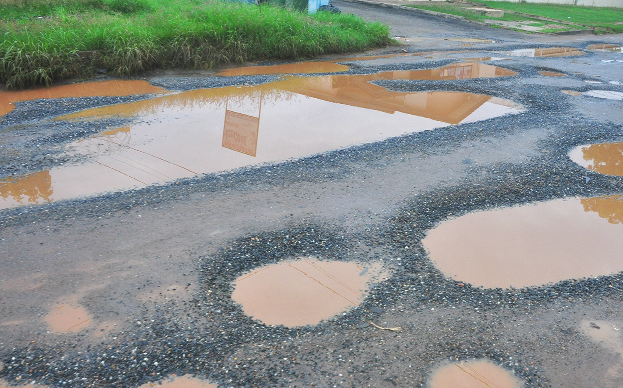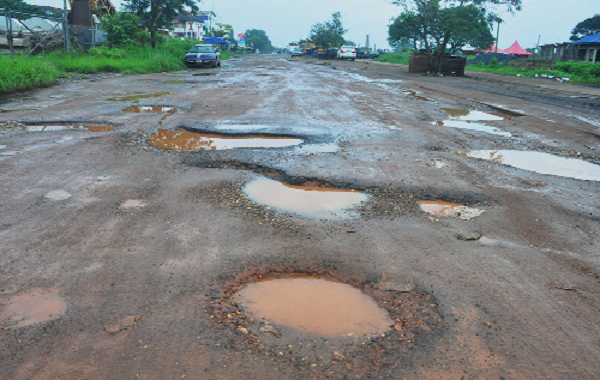 |
| ome motorists using a bad road in Community five,Tema Pictures: Samuel Tei Adano |
So much ink has been splashed on the state of roads in the Tema Metropolis but it appears the problem is far from being addressed.
Save the recent asphaltic overlay project which began from the Community 12 roundabout, through the Hospital Road (the frontage of the Tema General Hospital which terminated at the road in front of the St. Paul Methodist Cathedral) and a section of the Sakumono coastal Road and Valco Roundabout to the Tema Oil Refinery Junction, most of the roads in the metropolis are in a dire state and in need of urgent rehabilitation.
The situation has been worsened by the recent rains which have further deepened the craters on most inner roads in the communities making driving through the Harbour City and the Industrial areas a herculean task.
In February 2015, when the Metropolitan Chief Executive, Mr Isaac Ashai Odamtten, cut the sod for the commencement of work on the 4.5 kilometre asphaltic overlay project from the Community 12 roundabout, through the frontage of the Tema General Hospital to the St. Paul Methodist Cathedral area, one assurance that echoed was the release of funds for an additional 23-kilometre asphaltic overlay in the metropolis.
Specific mention was made of the stretch of road from the Tema Development Corporation (TDC) offices area through to the frontage of Tema Senior High School to the Tema Polyclinic oval. There was also mention of the Community Two roads, Industrial Area roads, among others.
Tema was among four other metropolitan areas selected by the Department of Urban Roads (DUR) to benefit from more than 250 kilometres of asphaltic overlays, as captured by the Daily Graphic in November, 2014.
 The other cities mentioned in that publication were Accra, Kumasi, Cape Coast and Sekondi-Takoradi. Work on the selected roads was to begin in January, 2015 and scheduled for completion within six months.
The other cities mentioned in that publication were Accra, Kumasi, Cape Coast and Sekondi-Takoradi. Work on the selected roads was to begin in January, 2015 and scheduled for completion within six months.
The selected roads in these communities were to be asphalted and critical drainage systems provided. The stretch of roads was also provided with road furniture, among other facilities, to improve their conditions and ensure safety for road users.
Current state
Fast forwarded to June this year, and the works earmarked for the Tema Metropolis are yet to materialise.
The potholes and patches that were supposed to be fixed to ensure smooth surfaces have further developed into deep craters of varying sizes, shapes and depths.
Earlier this year, some captains of industry, in the face of frustration threatened to withhold the payment of levies and fees until the Assembly fixed the decrepit road network particularly in the industrial enclave.
Indeed, the road from the Tema Steel Works Junction through the Driver and Vehicle Licensing Authority (DVLA) junction to the Tema Oil Refinery Junction needs serious attention. Though some efforts had been made on that portion of road in the past including the stabilisation of the base course, a lot more attention is needed on that road to facilitate easy travelling.
The Metropolitan Chief Executive for Tema, Mr Isaac Ashai Odamtten, during a working visit to some factories in the Industrial enclave recently told the media that the assembly acknowledged that some of the road infrastructure in the enclave needed critical attention.

He gave the assurance that the Assembly was committed to collaborating with its stakeholders to fix the roads.
Mr Odamtten disclosed that as part of efforts to address the bad road network in the industrial area, the assembly had initialled what he termed a 50-50 accelerated infrastructure development programme, which was a collaborative plan with its stakeholders including industry to help fix the roads.
 “By that, the assembly is calling on people who have immediate needs to team up with us with some cost-sharing arrangement for us to get the benefit of fixing those challenges.
“By that, the assembly is calling on people who have immediate needs to team up with us with some cost-sharing arrangement for us to get the benefit of fixing those challenges.
The road network is one of such projects and we will put a team together to talk to the industries in order to execute the concept,” he explained

Shared responsibility
While acknowledging the fact that development of the metropolis was the responsibility of the assembly, he maintained that residents and business operators had a role to play by ensuring that they paid their rates promptly to cushion its finances to take up more projects.
Another challenge the MCE touched on was the emergence of squatter settlement and slums not only in the residential areas but also in the industrial enclave. The assembly takes a strong view of the situation and would soon deploy its security sub-committee on slum control to the industrial parts of the city to deal with the issue.
The assembly, he said, would also deal with security needs such as the provision of street lights in the industrial enclave and provide a police post to curb the incidence of crime.
Win-win
The Chief Executive Officer of Reroy Cables, one of the companies visited by the mayor, Mrs Kate Quartey-Papafio, welcomed the concept of collaboration with the assembly to rehabilitate the roads and other infrastructure but stressed that it must be a win-win situation.
“If they (Assembly) say we need to collaborate, we will, but at the end of the day, we will take it out of our taxes. Because we pay the taxes, salaries, etc. If the roads are not being fixed and we are being called to contribute a little to the kitty, which will require that we borrow from the banks to contribute, then the only way out is that once we contribute, we are not going to pay taxes for some time to enable us pay back our loans”, she told journalists.
Nana Kwame Oteng-Gyasi, the Marketing and Business Development Manager of Tropical Cables and Conductors Limited, another factory the Mayor visited in an interview also bemoaned the state of the roads stressing that it was impacting negatively on the movements of products and raw materials to their premises.
To him, roads leading to the vital parts of the city such as the industrial enclave to facilitate the movement of goods and services to enhance production and generate more wealth deserve a better road infrastructure. He called on the assembly and other agencies to pay attention to the roads.
Some of the drivers reiterated the need for the assembly to rehabilitate the roads in the metropolis in order to make travelling more convenient. Mr Joshua Fosu, a taxi driver, plying Tema Community One to Sakumono said driving on the deplorable roads, especially between Communities two and three was nightmarish and frustrating and urged the assembly to take action.
It is the hope of many road users that the assembly will actualise its plans to tackle the challenge of poor network in the metropolis to help boost economic activities in the area.




No comments:
Post a Comment